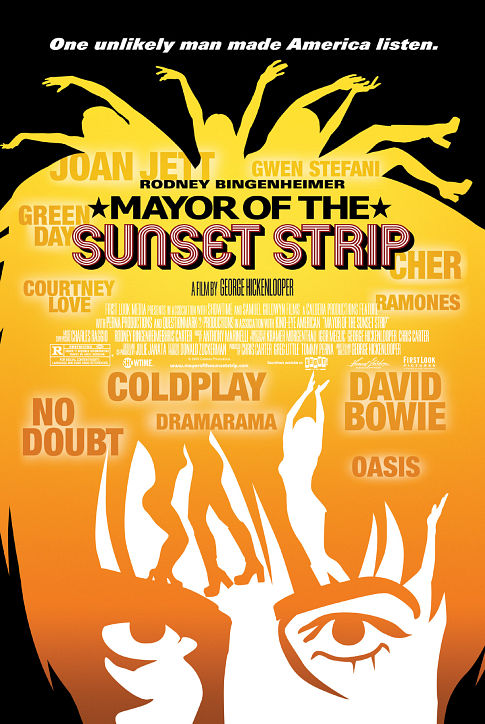
MAYOR OF THE SUNSET STRIP
(director/writer: George Hickenlooper; cinematographer: Kramer Morgenthau; editor: Julie Janata; music: Anthony Marinelli; cast: Rodney Bingenheimer (Himself); Runtime: 94; MPAA Rating: R; producer: Greg Little; First Look Pictures; 2003)
“Wistful oddball documentary by George Hickenlooper.”
Reviewed by Dennis Schwartz
Mayor of the Sunset Strip is a questionably themed documentary about fame (though seemingly sympathetic to the vulnerable vacant subject it features, yet it leaves him hanging in the end with a disquieting insufferable look at him as a sad and lonely figure pathetically clinging to memories of his celebrity souvenirs as a justification for leading such an empty vicarious life through the fame of others). This wistful oddball documentary by George Hickenlooper (Hearts of Darkness: A Filmmaker’s Apocalypse) tracks the rise and decline of the Zelig-like diminutive Rodney Bingenheimer from his drab upbringing in Mountain View, California, to his arrival on the Hollywood scene in the 1960s, to his first show-business experience as a double for Davy Jones on The Monkees, to his recognizable presence on the Sunset Strip that has him as a groupie mingling with celebrities, balling other wannabe celebs, and becoming a fixture from the 1970s to the present as a DJ for LA’s powerful KROQ, to his turn as a successful owner of an English disco on the Strip that introduced glam to the area, and finally to his current situation where the longtime DJ is being eased off the air by the radio station he served so faithfully all these years as a now fading icon who more than used up his Andy Warhol-like 15 minutes of fame.
Rodney’s divorced mom was a rabid autograph collector of celebrities, who dropped the teenaged Rodney off in front of the home of actress Connie Stevens and expected him to hook up with her or something like that. In any case, mom took off and the kid wasn’t able to see Stevens because she was shooting a movie on location. In a matter of fact way, Rodney says he didn’t see his mother again for around five years after that, as he moved into the Sunset Strip turf and never looked back. A host of celebrities recall Rodney with sweet but dull recollections, as they in almost perfect harmony sing his praises. The celebs include a grateful David Bowie, who thanks DJ Rodney for introducing him as an unknown into the Sunset Strip musical scene, Cher, Nancy Sinatra and the Beach Boys’ Brian Wilson. As a DJ, Rodney advocated alternative music and basked in the glory of introducing such diverse groups that made it big in his circle like No Doubt, Oasis, Dramarama, and Coldplay, and forming with them a mutually manipulative relationship.
This somewhat engaging film soon became a bore with inane celeb talk and the subject’s transparent blankness and lack of grit becoming wearisome. Rodney, posing as an innocent, is exploited by the users he hangs round with, his so called pals and lovers; and, he is further skewered by the filmmaker for being merely an example of the emptiness in celebrity worship. There was also an emptiness in this documentary that failed in its entertainment value (being only mildly amusing) and for its banal analysis of fame.
REVIEWED ON 4/29/2005 GRADE: C